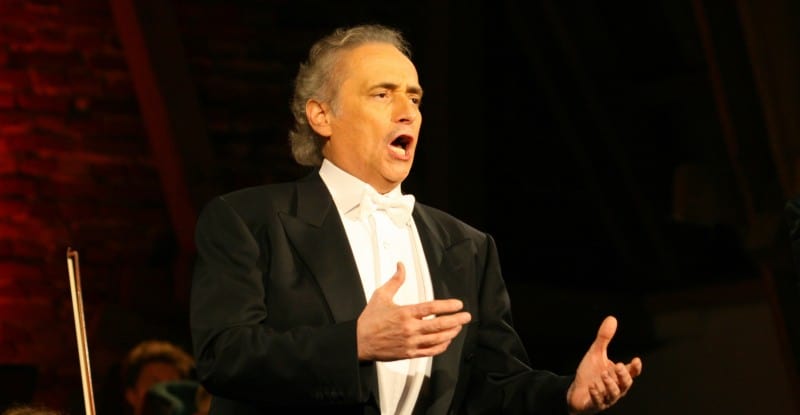Just when the season looked like it couldn’t possibly get any better, the Zorlu Center went above and beyond by featuring the crème de la crème of music: Jose Carreras!
There are certain names that transcend the boundaries of their genre and become renowned the world over. Jose Carreras is one such name. For the opera connoisseur, he is the cause of much enthusiasm and represents one of the genre’s finest voices, an immaculate technique, and the most memorable of performance at the most prestigious of opera halls.

But, like I said, he is an artist that has transcended barriers, his name is well-known beyond the confines of the opera niche. Your musical taste may be of another genre all together. However, just like you know of Pavarotti, or Domingo, or Callas, you will also be aware of the name and voice of Jose Carreras. And, chances are that you will also have seen the man on TV, and watched at least a couple of selections from the legendary Three Tenors performances, the series of concerts which brought together Jose Carreras, Placido Domingo, and Luciano Pavarotti on the same stage back in the 1990s and continue to be remembered to this day.
And, the concert hall was backed to the brim as the long-awaited performance drew closer and closer. The evening also had a pleasant surprise for me: the orchestra sharing the stage with Carreras was no other than Istanbul’s own IDSO, the Istanbul State Symphonic Orchestra. IDSO is the everlasting refuge of the classical music lover, giving performances every Friday evening at one of the selected venues throughout Istanbul, with enticing programs and very affordable tickets. I am a regular attendee, and was very pleasantly surprised to see familiar faces sharing the stage with the legendary Carreras.
The first performance of the evening was that of the Orchestra, the opening overture of Verdi’s opera Nabucco. It was a masterpiece, and I found it creative and smart that the opening notes of an evening featuring a hero of opera be launched by the overture, i.e., the initiating notes of an opera.
Jose Carreras had made his selections not from the arias of Verdi or Puccini, but from Neapolitan selections. The debut of the evening was “Passione,” of the late nineteenth-early twentieth century composers Valente and Tagliaferri of Italy. It was also a favorite performance piece of the legendary tenors Giuseppe di Stefano and Luciano Pavarotti, and is also a standard at any Carreras performance.
Another Neapolitan followed, L’ultima Canzone of late nineteenth century, and another favorite of Carreras, as well as among the repertoire of the other opera greats. Carreras left us in awe at his mastery of voice and the immaculate flow and feeling with which the notes came out. He is in his late sixties, but he still has it!

As Carreras stepped off the stage amid our applause-bordering-on-cheering, in stepped the lady of the evening: Soprano Simge Büyükedes, in her metallic black/blue dress and subtle blue highlights in her hair. No voice could have interpreted the “Song to the Moon” from Dvorak’s opera Rusalka in more impressive a way: her timbre took me to my CDs of Leyla Gencer and Nathalie D’essay. A glance at her biography revealed studies at Accademia Teatro della Scala – the Harvard of opera – and proved my fascination right. With a voice like that, she held her own while sharing the stage with such colossal a name as Carreras.
More Neapolitan selections followed, particularly of the Catalan region: the pretty, joyful “El eco de tu voz” and the splendid “Roso” of the Catalan sainet “Pel teu amor” (For your love), by composers Isaac Albeniz and Jose Ribas. The Istanbul State Symphonic Orchestra provided popular opera relief with the L’Arlesienne Suite #2 of Bizet. The blue and green curtains along the sides of the stage changed to red, and gentle percussion accompanied the strings for a sprightly, joyful, and witty Carmen favorite.
The evening continued on with one song in English, Mitch Leigh’s “The Impossible Dream” from the 1970s musical Man of La Mancha, inspired by the Cervantes’ classic Don Quixote. The younger generations applauded in awe at Carreras’ immaculate mastery of voice, while the older generations cheered also in remembrance of the musical, and of the subsequent movie that had featured the big names of the day, Sophia Loren and Peter O’Toole.
The second interval continued on with more Neapolitan selections from Carreras, and the entrancing voice of Simge Büyükedes. The two also joined in on a duet, Je te Veux (I want you) of French composer Erik Satie. One of the highlights of the second half was the closing Neapolitan “Core n’grato.” A piteous song of heartbreak, with gentle strings, a sad flute, sprinkles of the harp, and even subtle percussion; and the voice Carreras’ imploring against Katari’s ungrateful heart with legendary mastery of the note.
The Istanbul Symphonic State Orchestra, conductor Gimenez, soprano Büyükedes, and Carreras responded to the standing ovation by five encores. My long awaited Verdi came at last, and La Traviata’s Brindisi, one of the most joyful arias in opera, brought a cheerful, happy ending to an unforgettable evening.










[…] alone, they have brought before me such dream performances as the original Cats, Notre Dame, and Jose Carreras. And, it has introduced me to new names such as the Cuban ballet/dance group Ballet Revolucion, the […]
[…] familiar with the name, Büyükedes, a soprano with an enchanting voice, was the stage partner of Jose Carreras last year in his performance at the same venue. Yes, she is that good. The conductor will be Cem […]